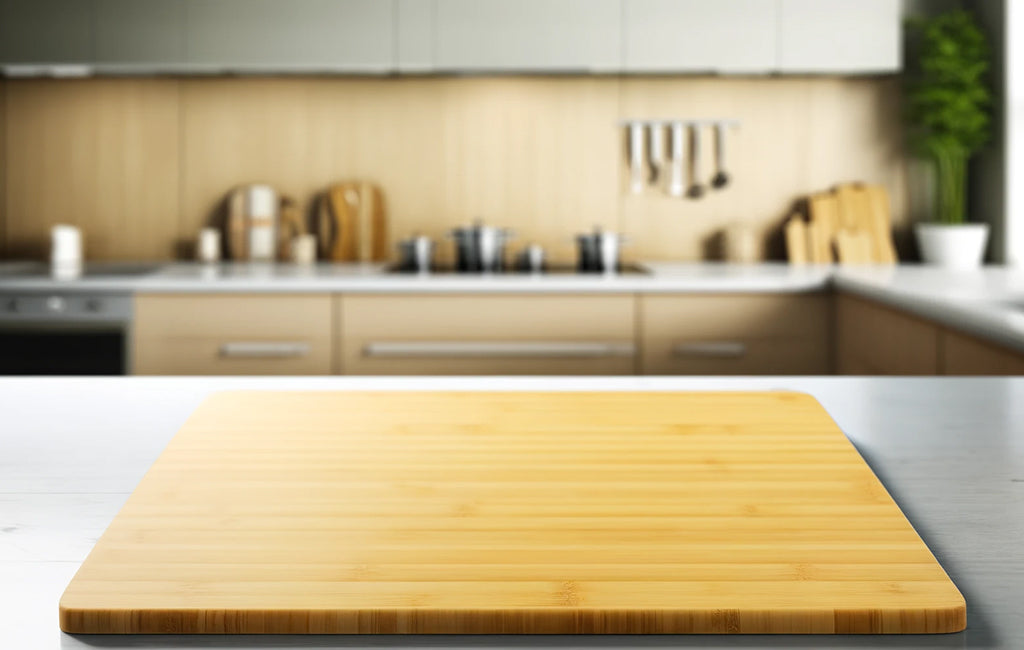
Is Bamboo Porous?
Share
If you’re considering a new cutting board for your kitchen, bamboo should be at the top of your list.
Bamboo is naturally antimicrobial and non-porous. This means that it resists bacteria and other harmful microorganisms much better than plastic or even other wood materials.
In addition to this remarkable property, bamboo does not absorb liquids easily because of its dense fibers.
Bamboo is extremely tough yet flexible making it resistant to deep scratches and nicks that can harbor harmful bacteria. While no cutting board is completely immune to knife marks over time, a quality-made bamboo board can withstand heavy daily use and still maintain its integrity.
Moreover, with proper care– such as regular cleaning with mild soap and water followed by air drying—bamboo cutting boards have been known to last for years.
You Get a Cutting and Serving Board All-In-One
Bamboo isn’t just practical; it’s also aesthetically pleasing with its clean lines and natural grain pattern that adds an earthy elegance to any kitchen setup.
Due to this visual appeal, bamboo cutting boards double excellently as serving platters for cheese spreads or appetizers when entertaining guests. No need for extra serving dishes when you have a beautifully designed bamboo board at hand!
Choosing a Board Made With Organic, Food-Safe Materials Keeps Chemicals and Lacquers Away From Your Food
Lastly, bamboo is one of the most eco-friendly materials available. It grows incredibly fast, requires little water and no pesticides to cultivate, making it a renewable and sustainable choice.
Some bamboo products, including bamboo straws and cutting boards, are treated with chemicals or finished with lacquers that can potentially leach into your food. Opt for boards labeled as ‘natural’ or ‘organic’, which signifies they’re free from harmful substances.
By choosing bamboo, you’re not just benefiting from its natural properties and durability. You’re also ensuring that no unwanted chemicals find their way into your meals while contributing positively to the environment.
Are bamboo cutting boards sanitary?
When it comes to choosing a suitable cutting board, cleanliness is a top priority. The good news is, bamboo cutting boards prove to be more sanitary than their plastic counterparts. But why is that? Here’s the catch – the nature of bamboo itself plays a significant role in this.
Bamboo has an inherent quality of being highly porous. This means it has tiny holes which allow it to absorb water and other substances. In the case of a cutting board, these pores absorb the juice that oozes out from fruits, vegetables or meats when they are cut. Consequently, they prevent these liquids from lingering on the surface where bacteria thrive, maintaining a clean and safe surface.
Moreover, bamboo has antimicrobial properties. It contains a substance called ‘bamboo kun’, which is proven to fight against bacteria and fungi. This not only helps in keeping your food safe but also extends the durability of your board by preventing microbial degradation.
These scratches become breeding grounds for bacteria that are hard to clean even with strong detergents or dishwashers; causing cross-contamination in your kitchen.
It’s also worth mentioning that bamboo straws share these similar traits with bamboo cutting boards and are becoming increasingly popular due to their sustainability and antibacterial properties.
It might be the last cutting board you buy
If you’re tired of replacing your plastic or wooden chopping board every few years, then switching to bamboo might be just what you need. Bamboo’s hard yet lightweight nature makes it incredibly durable and resistant to knife scars compared to traditional materials used for making chopping boards. Its high silica content adds an extra layer of strength which prolongs its life span significantly.
While regular cleaning and oiling can keep any wooden cutting board in good shape for many years; with bamboo, such maintenance becomes less frequent due to its natural resistance to water and bacteria. So, while the initial investment may be a little higher for a bamboo board, the long-term savings are considerable.
You get a cutting and serving board all-in-one
One of the advantages of using bamboo as your chopping board is that it’s not only functional but also aesthetically pleasing. Its rich, warm tones can be a stylish addition to your kitchen decor. More than that, it can double as a serving platter for cheese, fruits or breads – making it both practical and versatile.
Lastly, one of the most compelling reasons to switch to bamboo is its eco-friendliness. Bamboo grows rapidly and doesn’t require pesticides or chemical fertilizers for cultivation, making it an incredibly sustainable resource.
So next time when you’re in need of a new chopping board or straw – consider choosing bamboo for its sanitation, durability, versatility and environmental impact.
When it comes to kitchenware, the importance of a cutting board cannot be overstated. However, the material of the cutting board is equally crucial, as it directly comes into contact with the food you prepare. This brings us to one remarkable alternative to conventional plastic or wooden boards – Bamboo Cutting Boards.
One of the key reasons for using bamboo cutting boards lies in their unique characteristics, thanks to bamboo’s inherent properties.
1. Durability:Bamboo is known for its strength and durability, making it an excellent material for a cutting board. It’s less likely to scar compared with other wooden boards, and these minimal knife marks keep away harmful bacteria.
2. Sanitary:Unlike its counterparts, bamboo boasts natural antimicrobial properties and is less porous than other hard woods. This means that it absorbs fewer liquids, reducing the risk of fostering harmful bacteria – an important aspect when considering sanitary conditions in your kitchen.
3. Sustainable:Eco-friendliness is another significant advantage of bamboo cutting boards. Bamboo is a highly renewable resource and grows much faster than any wood, making these cutting boards a far more sustainable option compared with those made from traditional hardwoods.
4. Gentle on Knives:Bamboo is hard enough to resist deep scratches yet gentle enough not to dull your knives quickly – an ideal balance for preserving your kitchen cutlery.
5. Versatile:Bamboo cutting boards double as charming serving platters because of their smooth surface and attractive grain patterns.
Choosing a Board Made with Organic, Food-Safe Materials
When choosing a bamboo product like a cutting board or even bamboo straws, look for those made with organic, food-safe materials to ensure that they are free of any chemicals or lacquers which could potentially leach into your food during preparation.
In addition to these benefits, bamboo cutting boards require minimal maintenance and are easy to clean. Simply washing with warm soapy water after use and letting them air dry should keep them in great condition.
In light of these compelling benefits, it isn’t surprising to see why bamboo cutting boards could potentially be the last cutting board you’ll ever need to buy. They’re not just functional and durable; they’re also a healthier, more sustainable choice for your kitchen.
Choosing a Board Made With Organic, Food-Safe Materials Keeps Chemicals and Lacquers Away from Your Food
Food safety is a top priority in every kitchen. From the type of foods we eat, their preparation method, to the utensils we use, everything plays a significant role in our health. One such essential tool in any kitchen is the cutting board.
Unlike other common materials used for making cutting boards like plastic or glass, bamboo is an all-natural material. This means it doesn’t contain any harmful chemicals or lacquers which can leach into your food during preparation.
The All-natural Advantage of Bamboo
Bamboo is a highly renewable resource that grows at a fast rate without needing any form of pesticides or chemicals for it to thrive. This makes it an eco-friendly option for your kitchenware.
- Natural antimicrobial properties:Bamboo inherently contains antimicrobial agents that prevent bacteria and other harmful microorganisms from flourishing on its surface.
- Non-porous nature:Unlike other wooden boards, bamboo isn’t porous. This means it doesn’t absorb liquids easily which could otherwise lead to bacterial growth.
- High density:Bamboo’s high density ensures that the cutting board remains smooth and doesn’t develop grooves where bacteria can hide.
Other Benefits of Bamboo Cutting Boards
- Durability:Bamboo is known for its strength and durability. A well-maintained bamboo board can last for years without showing signs of wear and tear.
- Low maintenance:Cleaning a bamboo board is easy as it only requires warm water and mild soap. It’s also recommended to occasionally oil it with food-grade mineral oil to keep it in good condition.
- Aesthetically pleasing:The unique grain pattern of bamboo adds a touch of elegance to your kitchen. Additionally, it doesn’t dull knives as quickly as other materials do.
- Versatility:Bamboo boards are not just for cutting, they’re also great for serving. You can use them to serve cheese, fruits, and even sushi.
Bamboo products like bamboo straws and cutting boards are gaining recognition due to their eco-friendliness, durability, and safety features. With its numerous benefits, it could be a practical addition to your kitchen essentials.
Bamboo, being a naturally occurring plant, does not require the use of chemicals or lacquers to shape it into a functional kitchen tool. This means that your food will be in direct contact with only natural elements, avoiding any potential transfer of harmful substances that could occur with other types of cutting boards.
Why Bamboo?
Bamboo is not just any ordinary plant. It is one of the fastest-growing plants on Earth, making it an extremely renewable resource. Moreover, bamboo has inherent antibacterial and antifungal properties. This makes it an excellent material for anything that comes into contact with your food – including cutting boards.
No Chemical Lacquers
Many cutting boards on the market today are coated in chemical lacquers to give them a shiny finish and to prolong their lifespan. However, these coatings can chip off over time and potentially mix with your food. Bamboo cutting boards do not require such treatments as they have natural oils that preserve the wood and keep it looking fresh.
Not all manufacturers use only organic methods during production. It’s essential to ensure that the board is labeled as made from ‘organic bamboo’ and does not contain any artificial glues or binders.
An Eco-friendly Choice
Choosing bamboo also means making an eco-friendly choice. As already mentioned, bamboo is a rapidly renewable resource – some species can grow up to 3 feet in 24 hours! Furthermore, harvesting bamboo does not kill the plant; it continues growing after being cut.
An Unexpected Application: Bamboo Straws
The benefits of using organic materials do not stop at cutting boards. The same reasons apply when choosing other kitchen tools such as straws. Plastic straws are not only harmful to the environment but can also leach chemicals into your beverages. Bamboo straws, on the other hand, are a natural and reusable alternative.
Remember to look for products labeled as made from ‘organic bamboo’ to enjoy these benefits fully.
